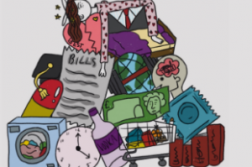Disclaimer: The views expressed within this article are entirely the author’s own and are not attributable to Wessex Scene as a whole.
As a female, merely one year older than Billie Eilish, I felt compelled by the nature of her latest single ‘Your Power’, which explores the idea of those who abuse their status to dominate and rule over those who are deemed less potent through the lens of society. You would not expect someone to have such experiences at just nineteen years of age, and so I should have been more startled by its contents, but unfortunately, I too am a young woman and know the harsh realities and pressures of being such.
At thirteen, pop-sensation Billie Eilish began working on songs with her brother Finneas in their family home in California. Just five years later she would go on to become the youngest person to win four main Grammy categories in the same year, and only the second to do so fullstop in the award show’s sixty-two-year history, following the hugely successful release of When We All Fall Asleep, Where Do We Go? [2019].
The immediacy of her rise to fame propelled her into the flashing lights of a media frenzy, which surveyed and picked apart her every movement, like a seagull swarming to a cone of chips on a hot summer’s day – swooping in fiercely to get the freshest scoop.
Her trademark baggy clothes and hair colour are just two of the many things about Eilish that relentlessly take the media by storm – this can be no better evidenced than through the fact a recent Instagram post, debuting her newly dyed platinum hair, reached one million likes in the record-breaking time of six minutes.
Yet, what differentiates Eilish from the crowd of other singing sensations and – I hate myself for using this term – ‘influencers’, is that up until this month, she had always chosen to conceal her body shape and advocate body positivity in a more unconventional way, covering up in loose-fitting clothes in a bid to move the media’s focus away from her appearance and onto her talents.
This choice seemed to have the opposite effect, however, as the media raged on at its appeal for Eilish to ‘reveal all’ and focused on how long it would be before she would give up the ‘act’ of not wanting to expose her ‘entire self’. Such persistence on their behalf neglected and diminished her talent, all in a bid to pursue another line of enquiry – her appearance.
During a Calvin Klein advertisement released in 2019, Eilish declared that ‘nobody can have an opinion because they haven’t seen what’s underneath’. This is something I have always idolised her for – she is not openly jumping on the next crazed diet, excessively exercising in the gym, or even advocating that women should look or appear a certain way. She is aware of the influence she holds, and instead uses it to advocate that women can present themselves how they want to be presented, making it very clear that it is their choice to do so.
What has particularly shocked me is that the media have been raising the same kind of sexualised remarks since she started out in the music industry at just thirteen years of age – a child.
Shockingly, this kind of treatment towards females is so normalised in the media, and in society, that I had not even considered this point of view until she raised it in her interview with Vogue earlier in the month, which presented Eilish in a new, more revealing light, whereby she proclaimed ‘it’s all about what makes you feel good’.
After reading the article online, I fell at the conclusion that women are brought up from an early age to see themselves as objects, battling for the attention and affection of others – desperate to be adored. Not by choice, may I add.
Even today, in the twenty-first century, I subconsciously question what I should be doing as a young woman, and whether what I wear and what I do will change how society perceives me, when what I really should be concentrating on is what I want for myself.
Billie Eilish has led the way for young women to realise that being body-positive does not always mean having to squeeze into tight, skinny jeans or into a societal mould that is too suffocating and confining to grow freely.
Some see her latest interview as going against these very beliefs, but I feel she was not weakened by the media’s desire to uncover, but instead empowered in her own decision to be who she wanted to be without fear of judgement. Eilish holds a beacon of light for young women like me, and for that I am in awe.
It remains to be seen whether the media will begin to sexualise Billie Eilish in the same way as they do with many other women in the public sphere, following her Vogue interview.
The sad truth is that it is not until we experience more of the world, that we realise our true privilege in this world isn’t the capital we possess, but the lack of barriers within our lives that allow us to live liberally. For several years I knocked feminism. I saw its stance as too radical, too visionary. Only as I got older did I begin to realise its true importance and value for women like myself.
Today, it goes far beyond the social and political movement it was once born to be. For strong female figures, like Billie Eilish, who hold a beacon of light towards contemporary feminist issues in modern-society, I will always be thankful.



